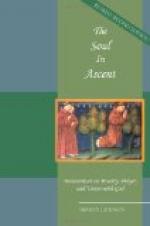always points toward the north. When it is uninfluenced
by distracting causes conscience always shows the
way toward truth and right. The Spartans believed
that lying was a virtue if it was sufficiently obscure;
and a Hindoo woman who throws her child to the god
of the Ganges does so because she is deeply religious.
Are not such persons conscientious? Yet they
perform acts which are in themselves wrong? Of
what value, then, is conscience? That they are
both conscientious and religious I have no doubt.
It is their misfortune to be ignorant. The light
appears to be colored by the medium through which it
passes, and yet it is not colored; and conscience
seems to approve what is wrong, and yet it never does.
It always impels toward the right, but men often make
serious mistakes because of their ignorance. The
needle in the moral compass is deflected by selfishness
or false teaching. The Hindoo mother might hear
and, if she dared to listen to it, would hear a deeper
voice than the one calling her to sacrifice her child—even
one telling her to spare her child. She has not
yet learned that it is always safe to trust the moral
sense. Superstitions are not conscience; they
are ignorance obscuring and deadening conscience.
Every man is born with a guide within to point him
to paths of virtue and truth, and one of the most
important lessons which the growing soul has to learn
is that when it is true to itself it may always trust
that guide. The call of his destiny finds every
man, and, when he hears it, he asks: How may I
reach that goal? It is far away and the path
is confused. Then a voice within makes answer,
and, if he heeds that, he will make no mistake.
That voice, I believe, is the result of no evolutionary
process, but is the holy God immanent in every soul,
making His will known. Evolution gradually gives
to conscience a larger place, but there is no evidence
that it is produced by any physical process. It
may be hindered by physical limitations, but it can
be destroyed by none. Why are we so slow in learning
that conscience, being divine, is authoritative and
may be trusted? I know no answer except this:
We so often confuse ignorance with conscience that
at last we conclude that the latter is not trustworthy.
But there we mistake. It is trustworthy.
It never fails those who heed its message. That
realization may now and then come early, but it seldom
comes all at once. Nevertheless it is a step to
be taken before the progress of the soul can be either
swift or sure.
The moment that the soul realizes that God is not far away, but within; that all the divine voices did not speak in the past, but that many are speaking now; that whosoever will listen may hear within his own being a message as clear and sacred as any that ever came to prophet or teacher in other times, it will begin to realize the luxury of its liberty, and something of the grandeur of its destiny. Truth and right are not fictions of the imagination, they




